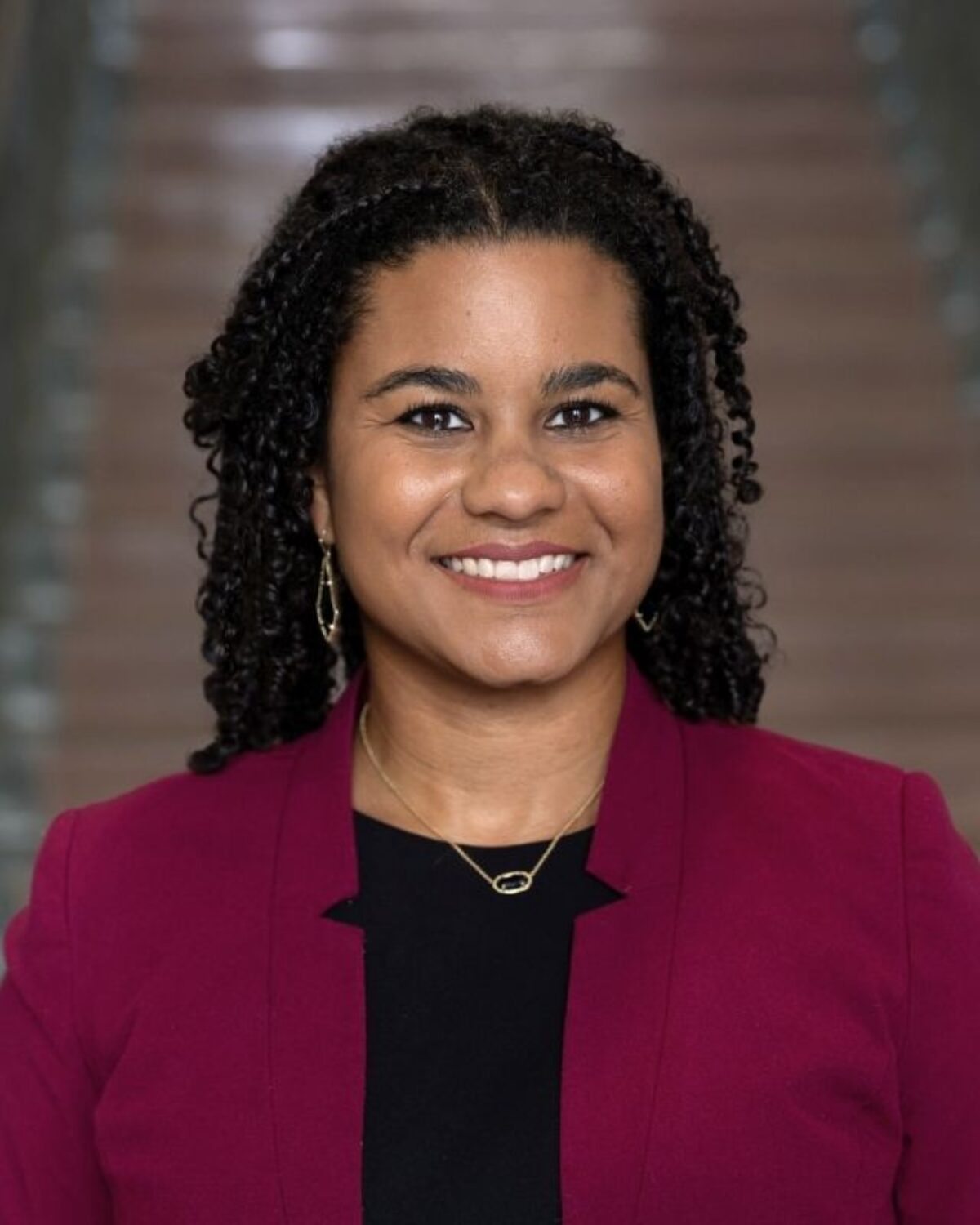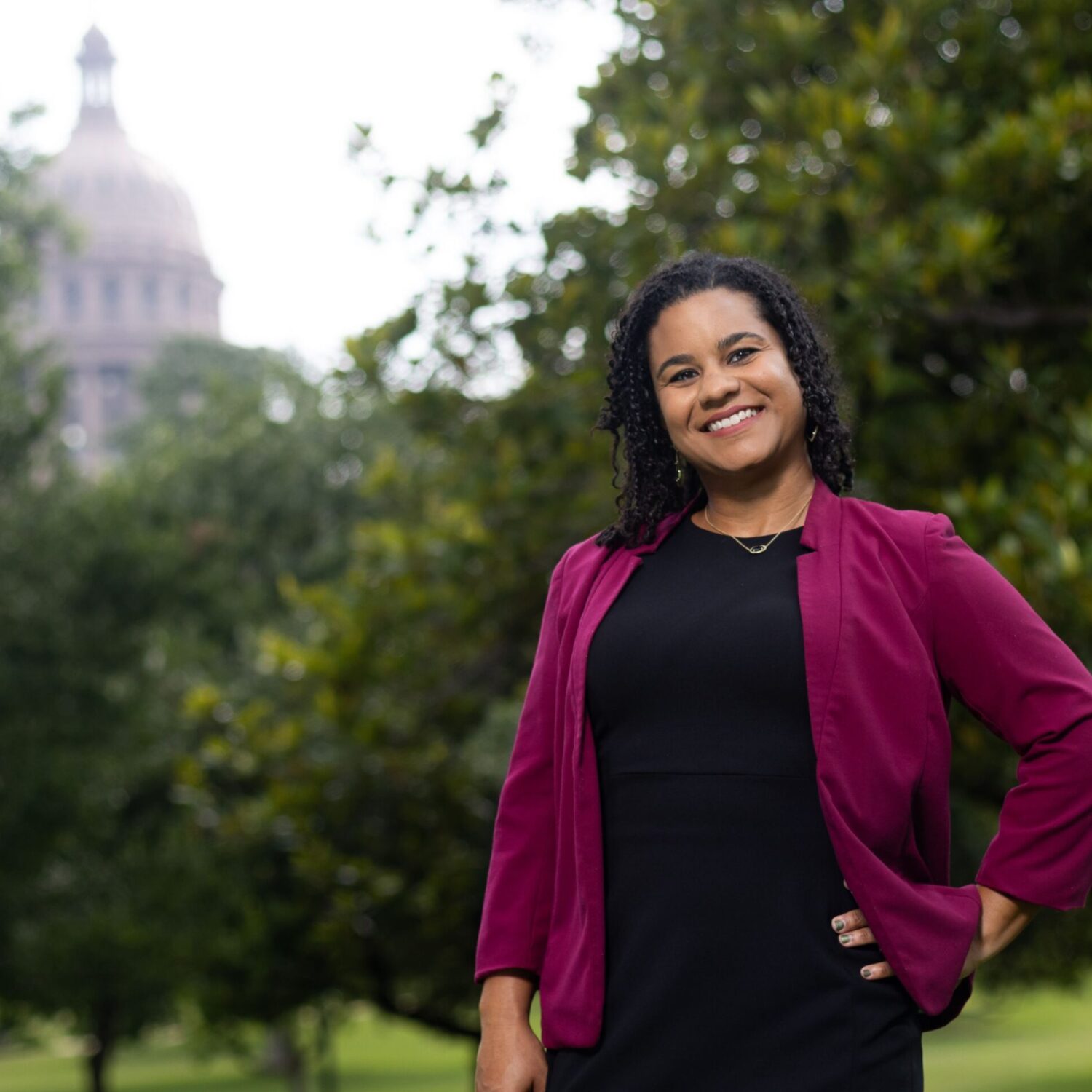
Paige Duggins-Clay ’17 has a self-professed tagline: education is a fundamental right. It’s a belief that has guided every turn in her career as a civil rights attorney.
At Texas Law, she immersed herself in the William Wayne Justice Center for Public Interest Law and public interest courses. After graduation, she earned a clerkship at the Texas Supreme Court with Justice Jeff Boyd, then joined the Austin office of Husch Blackwell LLP, representing public and higher education institutions in litigation, investigations, training, and compliance, always with equity at the center.
Now, she’s in “a fairy tale dream come true” position as the chief legal analyst for the Intercultural Development Research Association, a national nonprofit focused on equal educational opportunity. She coordinates IDRA’s legal research and strategy, expert testimony, and amicus curiae advocacy as the organization works to ensure all children can thrive academically through strong public schools.
We recently caught up with Duggins-Clay, whose work involves advocating for education policy, testifying and supporting families, educators, and their attorneys as they seek education justice through the courts. She’s one of four distinguished Texas Law graduates selected by the Law School’s Alumni Association to be recognized this year for their accomplishments in the legal profession.
Law school wasn’t without its challenges, but your time at Texas Law set the stage for where you are today. How did it prepare you for your current role?
Law school can be alienating and overwhelming for a first-generation law student like me. But right away, I joined the public interest community and listserv; the Justice Center became my home. I trusted and felt safe with its students and faculty. I’ll be forever grateful for being part of that community.
Through the Justice Center, I attended a public service career fair and gave my résumé to an attorney with the Mexican American Legal Defense and Educational Fund. Policy work seemed like a dynamic way to use a law degree. She looked at it and slid it back to me. My shoulders dropped. I thought, ‘Can you at least keep it and recycle it later?’ and I started walking away. She said, ‘Where are you going? We have a legislative session coming up, an internship to fill, and you’re hired.’ She saw I’d been a Luna Scholar for Sen. Judith Zaffirini and believed I could do the work. That attorney is now my boss at IDRA, Celina Moreno.
You say you weren’t a “classically successful law student.” What do you mean by that?
While some people measured success by grades or job offers, I saw other metrics of success as inherently valuable, like serving as student leader organizing activities for the Justice Center and being on the Texas Journal on Civil Liberties & Civil Rights my first year. Those were important acts of service I’m really proud of. They showed me I was talented, smart, capable, and that I could accomplish things. When I interviewed for my clerkship, Justice Boyd, who I adore, said my grades were lower than what he’d typically hire, but he thought my writing sample was outstanding and my track record of public service was impressive.
Listen when the universe brings someone into your life that you feel curious about, or feel a connection to, whether it makes sense or not. Be open to that relationship, because you never know what will come out of it.
That clerkship has left a lasting impression. What did you take away from the experience?
Justice Boyd hired me as what I believe was his first-ever “counter clerk,” knowing I had politically and potentially ideologically different views from him. He saw the benefit of having a diverse viewpoint to help him reach balanced decisions. We worked hard, and I think did a really good job for the people of Texas because of the understanding and mutual respect we had for each other. It just goes to show you can find common ground. My biggest takeaway from that is hope. That people can work together for a more just society. Having consciousness about who someone is—and what they might bring to the workplace or negotiation table because of their difference and diversity—that’s a really important exercise.
After that, you went to Husch Blackwell.
I’m grateful for my experience. I had a great mentor, the opportunity to learn from smart people, and make excellent money at a time when I really needed that. It was critical for me my first few years. I learned litigation skills, argued and won my first summary judgment motion and case, and went to trial. These are all skills I draw from now on a regular basis. The work also taught me about my limits and setting boundaries. I was a mom to a six-week-old when I started, and I needed to do the work in a way that promoted the health and wellness of my family.

How did the pro bono work you did at the firm open the door to your current role?
I had stayed in touch with Celia (Moreno) when she moved from MALDEF to IDRA, and the organization became my first pro bono client. Here I was, this first-year associate and general counsel for a nonprofit. I wrote several briefs in furtherance of the organization’s mission, including one for the U.S. Supreme Court. In 2021, after a Texas legislator sought Attorney General Paxton’s opinion on whether “anti-racism” teachings or critical race theory practices—which analyze American history through the lens of racism—in public schools and institutions might violate federal and state civil rights laws, I gathered stories from students across Texas and put together a legal advisory letter. That type of nontraditional advocacy creates opportunities for young people to have their voices heard. Eventually, after I had my second child in the midst the COVID-19 pandemic, IDRA asked me to come in-house. I realized the pro bono work was filling my cup—there’s nothing like a pandemic to put things in perspective—and I came onboard.
What do you see as some of the top challenges for students today?
In Texas, young people have very little, if any, recourse to filing civil rights complaints right now. It’s also catastrophic that millions to even billions of dollars in funding both at the federal and state level are being shifted and deployed into the private sector, and it will have impacts for generations. Hateful rhetoric from adults, which is being normalized, impacts children and school climates, too. I really wish we could get back to some form of commonsense law and policymaking that’s in good faith and designed to actually help kids.
All young people deserve to go to a high-quality public school regardless of what they look like, what faith they practice, what zip code they’re in, how much money their family makes, and what country they came from.
How do you envision your future as a lawyer?
I want to believe that when we get balance restored to the various branches of government, we’ll return to a time of legal practice that’s civilized and guided by the rule of law. I’ve always wanted to be a judge. Is that possible in Texas for a Black woman who’s never been on the Texas Supreme Court? I don’t know. What I do know is that my passion for civil rights and education is enduring and I’m going to continue to be creative and nimble and use my skills as an attorney to make a better world. That, I’m very clear about. I’ve also taught as an assistant professor of practice at UT’s College of Education. Teaching is something that I want to do more of.
Any advice for your fellow alumni and current law students?
Listen when the universe brings someone into your life that you feel curious about, or feel a connection to, whether it makes sense or not. Be open to that relationship, because you never know what will come out of it.
Finally, as Outstanding Young Alumna, what does it mean to you to be honored by your fellow alumni and the Law School?
I was so stunned. When you take a nontraditional path like I have, sometimes you’re passed over for more traditional recognitions. You have to find validation, joy, and meaning in other ways. It means a lot that the Law School looked at what I’ve accomplished in my relatively short path and think it’s worth uplifting. I’m so grateful.
